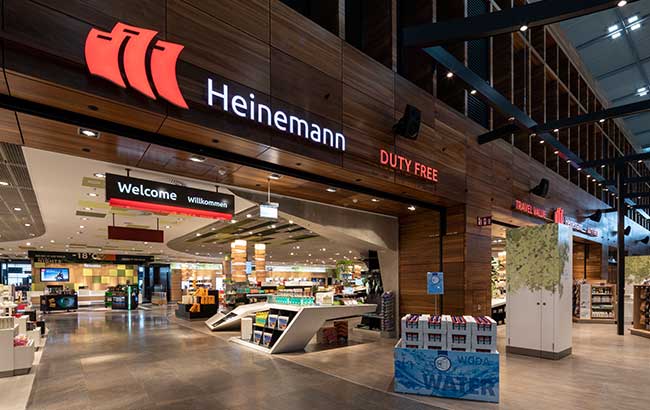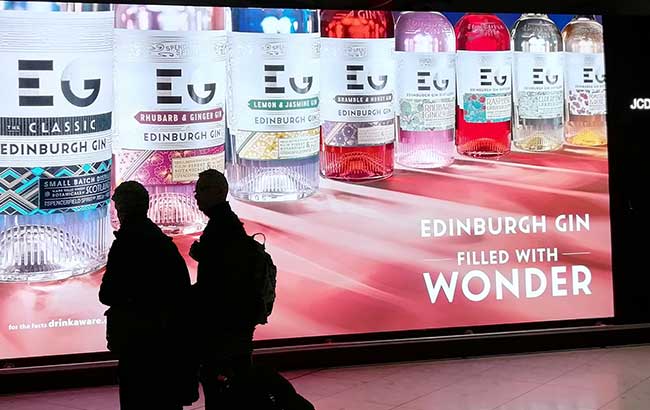Spirits in travel retail: mapping the road to recovery
Now that passengers are starting to take to the air and the seas, spirits brands in global travel retail are hard at work to make the most of their return.

*This feature was originally published in the October 2021 issue of The Spirits Business magazine.
As one of the hardest‐hit sectors, global travel retail (GTR) has had a tumultuous 18 months. As a result of the pandemic, borders were closed, quarantine requirements were introduced, and consumer confidence plunged amid fears of spreading the virus.
However, as vaccination rollouts progress well in countries in Europe, as well as China, India and the US, and border restrictions are lifted, the travel retail sector is poised to recover over the next few years. In the channel, brands and retailers have been forced to adapt to new shopping behaviours.
For spirits producers, GTR remains an increasingly important channel, with brands adopting new and seamless ways to attract time‐strapped consumers who are seeking unique products and experiences.
Challenging times
Jaya Singh, president of the Tax Free World Association (TFWA), says: “The past two years have been some of the most challenging for the duty free and travel retail industry. However, we are starting to see the green shoots of recovery as global vaccination programmes begin to take effect and nations continue to ease border restrictions to allow the free movement of travellers.
“The latest figures from travel research firm Paxsmart forecast that global international departure numbers will return to pre-pandemic levels by 2023, before rising to just under two billion in 2024 – an increase of 9% from 2019.”
According to figures from IWSR Drinks Market Analysis, total spirits volume in the travel retail channel fell by more than 70% in 2020. IWSR expects spirits volume in GTR to grow by an approximate compound annual growth rate (CAGR) of 31% in the five years to 2025, returning to pre‐pandemic volume levels by 2024.
Agave spirits, which reported the biggest drop among spirits in 2020 (down by 79%), will recover fastest, IWSR found. The sector is expected to rise by 39% in volume (CAGR 2020 to 2025), followed by whisky (up by 32% for the same period), vodka (up by 31%) and gin/genever (up by 30%). By market, IWSR analyst Jairo López Suárez says: “2021 is predicted to favour the Americas first, mainly US/Mexico/Caribbean leisure travel, but also functioning land border traffic US/Canada/Mexico and in Southern Brazil.
“Growth in Europe and Asia Pacific will remain somewhat muted until at least early 2022, though Asia is looking more complicated than was originally projected, with some travel forecasts being revised down recently, and vaccination rates in Europe increasing confidence there.”
Travel retail operator Heinemann notes that some spirits categories have been hit harder than others due to the absence of intercontinental shoppers from China, Russia, and the US. “These travellers are traditionally the ones with the largest basket spend – Cognac or baijiu sales, for example, are still lagging behind due to this,” explains Ruediger Stelkens, director of purchasing for liquor, tobacco and confectionary at the firm.

Rare spirits in demand
Stelkens believes that spirits will be among the first product categories to bounce back in travel retail. He also highlights that the demand for rare spirits has been exacerbated by the pandemic. “We’re being offered more and more highly exclusive rare or ultra-premium bottles of aged whiskies and Cognacs,” he notes.
Travel retail operator Lagardère also notes the decline of travellers in Europe, who were “big buyers of ultra‐premium spirits, Cognacs but also Grand Crus wines”, says Victoire Gueugnier, director merchant beverage and tobacco, Lagardère Travel Retail Duty Free Global. Lagardère’s strategy for the channel has been to highlight “best‐sellers at the best price” and give them greater visibility.
“Categories like Champagne and whiskies are really performing better than the rest due to European passengers buying more well-established brands at a good price rather than premium and super‐premium products, which were preferred by the international clientele,” she adds. “Our focus has been to give greater focus to best‐selling references.”
The pandemic caused a revenue decline of 67% for Heinemann in 2020. “We are cautiously optimistic about the year 2021 with a gradual pick‐up in travel, but we are rather expecting a long‐term recovery for our industry that will be clearly felt in 2023 and 2024,” Stelkens adds.
Major spirits players also saw their sales in the channel continue to decline, despite continued investment in GTR. Pernod Ricard’s GTR sales dropped by 40% in its 2021 fiscal year, with the firm expecting a gradual recovery. For the year ending 30 June 2021, Diageo saw GTR sales decline by 62%, with the firm’s Scotch sales plummeting by 60% in travel retail.
Stephen Teeling, sales and marketing director of Dublin‐based Teeling Whiskey Company, notes that the Irish whiskey category remains “very under‐represented” in the channel. But he has noticed that consumers are spending more on spirits, and trading up to more expensive bottlings as they return to travelling.
“While passenger numbers are down, there is a huge increase in spend per customer,” he says. “Dublin Airport said that on its recent short‐haul flights, people are picking up a lot of bottles.” Teeling highlights that the “well-travelled” routes between Ireland and England have also seen consumers spend more in duty free, as well as on Irish ferries.
Ian Macleod Distillers has several “high-profile” activations planned for Glengoyne whisky and Edinburgh Gin in major UK airports in the run‐up to Christmas. There are plans for more activations from its brands in 2022.
“We are launching a completely new, GTR-exclusive aged range from Glengoyne next spring, and have exciting plans for another of our whisky brands, which we will announce later [in 2021],” says William Ovens, business development director.

TFWA’s vice‐president, commercial, Donatienne de Fontaines‐Guillaume, highlights the rise of domestic travel in China as a bright spot for retailers and brands. “In particular, Hainan Island has experienced a boom in trade following incentives from the Chinese government to increase citizens’ allowances for off‐shore duty free shopping,” she explains.
“Sales at Hainan’s duty free shops increased by a staggering 127% year on year to just over US$5 billion in 2020, and are continuing to grow. We are seeing a number of spirits brands opening concessions in Hainan to take advantage of this growth.”
In January 2021, Pernod Ricard opened its first boutique for Martell Cognac in China Duty Free Group’s Haitang Bay Duty Free Shopping Centre. It was the first Pernod Ricard‐owned store on the island. This summer also saw Diageo open two permanent shops for Scotch brands Johnnie Walker and The Singleton at the Hainan Tourism Duty Free Shopping Complex in downtown Sanya.
Vinay Golikeri, managing director of Bacardi GTR, called for greater collaboration in the industry: “With online pre‐travel research driving a significant level of decision‐making amongst Chinese spirits shoppers, it is vital that brands and retailers partner in the omnichannel opportunity as Hainan continues to grow – while paving the way for shopper engagement strategies in any future locations that may adopt a similar duty‐free structure to Hainan.”
Teeling is also hoping to collaborate with China Duty Free for Chinese New Year and will work with Dublin Airport on tastings in the fourth quarter.
Digital adoption
Norms around physical distancing and hygiene in travel hubs will ultimately affect how brands and retailers attract customers as they remain cautious about sampling. As such, the implementation of digital solutions has become increasingly important to both protect customers and make the shopping experience simpler.
TFWA’s Fontaines‐Guillaume says: “While we are seeing growing numbers of passengers returning to the skies and seas, their shopping needs will likely have changed dramatically in their time away from travel. Many will now be accustomed to having more control over their purchases through online shopping sites or digital ordering services. At the same time, new concerns over hygiene may dissuade some travellers from tasting and handling products at physical duty free stores, adding a new set of challenges for retailers and brands.”
For Bacardi, the biggest opportunity in the channel is digital adoption, with the company focusing on personalisation and engagement.
“This new behaviour among consumers means there is now an expectation for digital to play an essential role in their retail experience and the evidence proves it is a significant influence on their purchase-decision behaviour,” Golikeri says. “This step-change is fully embedded in the future of shopper behaviour, and we are seeing its positive impact in travel retail.
“We strongly believe this is a truly transformational opportunity for travel retail; to reinvent itself as a unique and exciting omnichannel market.”
Bacardi noted that there is a “great opportunity” to prioritise gifting and GTR exclusives, as well as tap into the trend for at-home cocktail making by providing products, experiences and inspiration for shoppers.
John McDonnell, managing director, international for Tito’s Handmade Vodka, believes the industry would benefit from one app for duty free, similar to Uber, that would enable consumers to get GTR spirits delivered to their homes via contactless payment.
Meanwhile, Heinemann is working on several new projects to diversify its retail and service offering to “meet the ominichannel needs of younger and new target groups”.

One example is new solutions for pre‐order services or digital payment solutions. Teeling also cited Chinese e‐commerce player Alibaba’s purchase of a nearly 10% stake in duty free giant Dufry in 2020. The deal includes a joint venture in China that will combine Alibaba’s digital capabilities and network with Dufry’s travel retail business in the market.
The move could provide the opportunity to have products delivered to your home from the airport, notes Teeling. “People have become used to good service, and will expect things to become a lot easier than they were pre‐pandemic.”
Teeling will focus on collaborative projects in GTR, providing “rich content” such as videos to duty free operators to bring to life the story of the Irish whiskey brand. The company will also roll out its Explorer’s Edition whiskey in Dufry stores in the UK during the fourth quarter of 2021. The producer has planned some special products to celebrate St Patrick’s Day in March 2022.
Cruise industry
IWSR expects the land border, ferry crossing and free zone business to return to strength earlier than the air travel and cruise sectors. The cruise industry has started to reopen, with companies such as Carnival and Royal Caribbean reporting sky‐high demand for forthcoming cruises.
Michael Payne, president of the International Association of Airport and Duty Free Stores (IAADFS), says cruise ships have been “hurt severely’ by the pandemic.
“Cruise ships in many locations haven’t been able to leave the port for a while,” he adds. “That’s only just starting to open up but they won’t be able to bring as many people on board, which will have an impact on buying.”
Ian Macleod Distillers continues to remain focused on the cruise sector, hosting a stand at the Viking Line’s Cinderella Whisky Fair in September 2021.
“The enthusiasm, knowledge and passion among these consumers was as strong as ever,” says Ovens. “We were showcasing Rosebank, Glengoyne, Smokehead, Shieldaig and the main attraction on the stand, the Viking Line‐exclusive Chieftain’s 24‐year‐old single cask, which all but sold out on the first cruise.”
For Tito’s, cruise ships are a “major focus because we can do activations on ships”, explains McDonnell. Furthermore, the brand is trying to secure more airline listings, having gained some with Aer Lingus and Middle East Airlines before the pandemic. “We’re really pushing the smaller formats of Tito’s in GTR, it’s a good impulse buy,” McDonnell adds.
Broader portfolio
Dutch drinks firm De Kuyper will emphasise its Peachtree liqueur, Cherry Heering Liqueur, and, more locally, Rutte Gin, in airport outlets. “With our broader portfolio we will focus on airport lounges and cruise ships, where we are sure that the global rise of cocktails will give us serious opportunities,” says Mark de Witte, CEO of De Kuyper Royal Distillers.
The move is in line with the company’s strategy to ‘own the cocktail’. “The main challenge is the limited space”, adds de Witte. “Global and local brands are competing for the same shelf space.”
IWSR’s Suárez also highlights that business travel is “increasingly unlikely” to return to its previous extents as consumers adapt to new ways of working.
He adds: “The environment impact of travel is also a pressing concern for many individuals and businesses.”
Related news
Top 10 spirits launches in June
